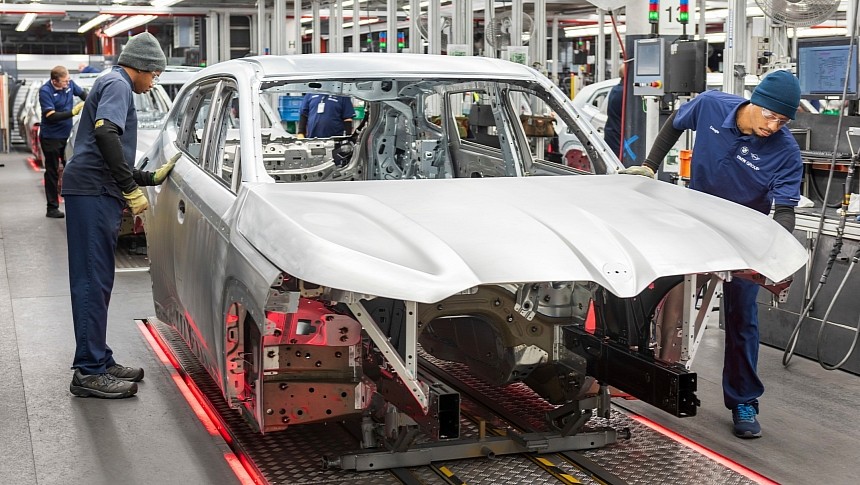It is the end of an era for BMW. The Bavarian carmaker ended production of internal combustion engines in Germany. This way, they are making room for the EV manufacturing. Yet, this is not the end of ICEs for the carmaker.
All production of internal combustion engines has been relocated to Steyr in Austria and to Hams Hall in the United Kingdom. The move includes both petrol and diesel engines, with and without electrification (mild-hybrid, hybrid, and plug-in hybrid). The plant in Germany will be converted for the production of electric cars. BMW is investing approximately 400 million euros for the switch.
The facility has already been building EVs, such as the i4, which has been rolling off the assembly line there since October 2021. The electric variant of the i3, in both sedan and Touring body styles, will be built there. Furthermore, the Neue Klasse (New Class) EVs will also be manufactured there, starting in 2026. Six of them will be launched between 2025 and 2027.
The first of the upcoming models was previewed by a concept car with a look that alleviates from the design BMW enthusiasts have been used to over the years. The platform that underpins it has been specifically designed to support internal combustion powertrains as well. So, it is obvious that this is not the end of the BMW ICEs.
BMW has been planning to make the move since November 2020. The last combustion engine to be assembled in Munich was an eight-cylinder V8 on November 10, 2023. Cars such as the M5 or the X5 M, for instance, are powered by this engine. Now, the 4.4-liter V8 and the 6.6-liter V12 will be built in the UK, while smaller petrol and diesel units will be manufactured in Austria.
There are approximately 1,200 employees who were previously involved in internal combustion engine construction. They will all be retrained and deployed in other sectors of production or to other BMW locations in Germany.
The BMW iX, the i7, and the i5 are manufactured in Dingolfing, while the iX1 and iX2 electric crossovers see the light of day in Regensburg. BMW is also building a battery test center at the Wackersdorf plant. According to the German media, a battery assembly plant will also operate in Strasskirchen, following a positive outcome of the referendum that took place back in September.
BMW has never set a deadline for the ICEs, while most carmakers indicate 2030 as the year they will complete the switch from petrol and diesel engines to a complete EV lineup. The Germans will continue to see cars powered by internal combustion engines as well as EVs in most markets. Meanwhile, Mercedes chose 2025 as deadline, while Audi pledged to ditch ICEs in 2026.
The facility has already been building EVs, such as the i4, which has been rolling off the assembly line there since October 2021. The electric variant of the i3, in both sedan and Touring body styles, will be built there. Furthermore, the Neue Klasse (New Class) EVs will also be manufactured there, starting in 2026. Six of them will be launched between 2025 and 2027.
The first of the upcoming models was previewed by a concept car with a look that alleviates from the design BMW enthusiasts have been used to over the years. The platform that underpins it has been specifically designed to support internal combustion powertrains as well. So, it is obvious that this is not the end of the BMW ICEs.
BMW has been planning to make the move since November 2020. The last combustion engine to be assembled in Munich was an eight-cylinder V8 on November 10, 2023. Cars such as the M5 or the X5 M, for instance, are powered by this engine. Now, the 4.4-liter V8 and the 6.6-liter V12 will be built in the UK, while smaller petrol and diesel units will be manufactured in Austria.
There are approximately 1,200 employees who were previously involved in internal combustion engine construction. They will all be retrained and deployed in other sectors of production or to other BMW locations in Germany.
The BMW iX, the i7, and the i5 are manufactured in Dingolfing, while the iX1 and iX2 electric crossovers see the light of day in Regensburg. BMW is also building a battery test center at the Wackersdorf plant. According to the German media, a battery assembly plant will also operate in Strasskirchen, following a positive outcome of the referendum that took place back in September.
BMW has never set a deadline for the ICEs, while most carmakers indicate 2030 as the year they will complete the switch from petrol and diesel engines to a complete EV lineup. The Germans will continue to see cars powered by internal combustion engines as well as EVs in most markets. Meanwhile, Mercedes chose 2025 as deadline, while Audi pledged to ditch ICEs in 2026.





